Premium Only Content
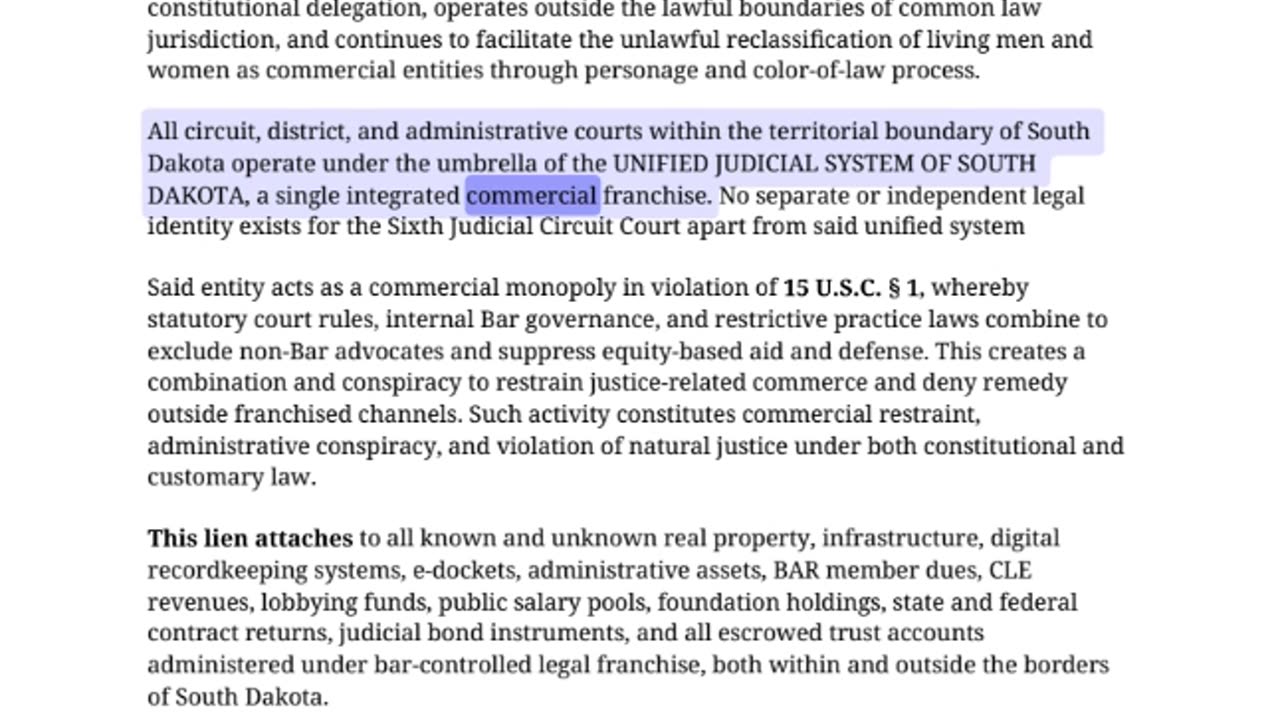
Non-UCC-1 - A commercial entity lien of $100,000,000.00 against the Unified Judiciary of South Dakota
The Complete Lien Can Be Accessed Via the State of Colorado, where the Non-UCC filing is certified and bonded for 405 million (Lawful Money)
9. The Respondents cited SDCL 16-18-1, a statutory prohibition on unauthorized legal practice, to suppress access to lawful defense, which constitutes a monopoly on justice in violation of:
• First Amendment – Guarantees the unalienable right to petition the government for redress of grievances, to speak, assemble, and associate for lawful purposes, including:
o The right to associate in private or public capacity for mutual aid, lawful defense, and estate protection;
o The right to appoint or receive assistance from non-bar advocates, next friends, or private attorney generals without interference or discrimination;
o The right to submit filings, notices, and demands without being compelled to use corporate legal representation;
o And the right to peacefully challenge maladministration, corruption, or violation of natural or constitutional rights.
Any effort to obstruct or condition these rights through bar monopoly statutes, administrative policy, or licensing schemes constitutes a direct violation of the First Amendment and evidences unlawful suppression of conscience, remedy, and lawful process.
• Fourth Amendment – Protects against unreasonable searches and seizures, including:
o Unauthorized intrusion upon private property, correspondence, or secured estate instruments;
o Interference with lawful roles such as executor, trustee, or representative operating in private capacity or in propria persona;
o Unlawful appropriation or administration of private or personal property without judicial due process or consent of the living principal;
o Imposition of administrative process under color of law absent verified jurisdiction or lawful delegation.
• Fifth Amendment – Prohibits the deprivation of life, liberty, or property without due process of law. This includes:
• The imposition of statutory penalties or jurisdiction without a verified, constitutional nexus;
• The seizure, conversion, or administration of private estate property without consent or lawful adjudication;
• The presumption of personage or artificial legal status absent full disclosure and contract;
• And the unlawful assumption of authority by actors who fail to prove delegation, standing, or constitutional oath.
Any constructive fraud, coercive silence, or failure to provide notice and opportunity to be heard constitutes a direct violation of this Amendment and triggers liability under equity, common law, and federal civil rights protections.
• Seventh Amendment – Guarantees the right to trial by jury in suits at common law and secures access to remedy under the rules of law and equity, which is denied when:
• Statutory courts suppress private standing or block rightful claims based in equity, conscience, or natural law;
• Administrative tribunals refuse filings or evidence from non-bar individuals acting in lawful capacity;
• Monopolized legal systems substitute corporate procedure for true due process under the law of the land;
• Courts operate under contractual fiction rather than constitutional delegation, barring access to genuine common law justice.
The suppression of trial by jury rights, or forced participation in commercial jurisdictions without consent, constitutes a constructive denial of remedy, unlawful conversion of legal standing, and direct violation of this Amendment’s protections.
• Eighth Amendment – Prohibits the imposition of cruel and unusual punishments, which includes:
• Denial of lawful aid or in propria persona assistance necessary to prevent harm, injustice, or irreparable injury;
• Use of sanctions, threats, or penalties to obstruct redress, intimidate private parties, or suppress constitutional remedy;
• Enforcement of statutory monopolies that deny fundamental rights or impose burdens upon those asserting conscience, common law standing, or equitable claims;
• Excessive legal hurdles or administrative gatekeeping, resulting in injury to life, liberty, property, or standing in equity.
Such acts, especially when used to silence rightful defense of an estate, obstruct lawful participation, or penalize invocation of fundamental rights, constitute cruel treatment and unlawful abuse of authority under both the Eighth Amendment and international standards of (human) dignity and access to justice.
• Ninth and Tenth Amendments – Affirm and preserve the rights of the People which are not delegated to the federal government nor enumerated in the Constitution, including:
• The right to operate in private capacity as a living man or woman;
• The right to lawful remedy in common law, conscience, and equity;
• The right to appoint aid or defense outside licensed statutory systems;
• And the inherent right to self-governance and self-correction without subjugation to private legal monopolies or foreign legal constructs.
These Amendments guarantee that all powers not specifically granted to the United States or prohibited to the States remain with the States or the People, forming a constitutional firewall against overreach, personage, or compelled corporate identification.
• Article I, Sections 9 and 10 – Prohibitions against bills of attainder, ex post facto laws, and the granting of titles of nobility; and requirement that only gold or silver coin be made a tender in payment of debts, reinforcing the demand for lawful money over fiat instruments.
• 15 U.S.C. § 1 (Sherman Act) – Prohibits any contract, combination, or conspiracy in restraint of trade or commerce. The Respondents, by invoking SDCL 16-18-1 and enforcing bar-only legal monopolies, have unlawfully restrained access to lawful remedy, suppressed alternative aid in equity, and deprived the living heir of access to effective defense and estate justice. Said acts amount to commercial exclusion and collusion in restraint of trade, directly violating antitrust protections
That such suppression is conducted under the guise of regulatory protection, yet functionally constitutes a bar-enforced commercial monopoly, maintained by a private, foreign-influenced trade guild operating without lawful delegation or full disclosure. The American Bar Association (ABA), and its state affiliates including the South Dakota State Bar Association (UCMJ), STATE BAR OF SOUTH DAKOTA (UCC), operate as unregistered foreign agents within the meaning of the Foreign Agents Registration Act (FARA) and engage in nontransparent collusion with state offices to impose unlawful barriers to remedy, as further evidenced by their refusal to register under FARA, U.S. Code Title 22 §§ 611–621.
People ex rel. Chicago Bar Ass’n v. Goodman, 366 Ill. 346 (1937): Bar associations are not public offices or authorized governing entities.
-
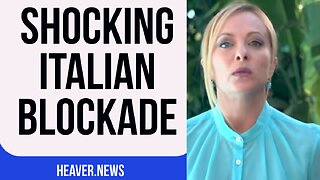 4:23
4:23
Michael Heaver
8 hours agoItaly Suffers Extreme BLOCKADE
2.68K1 -
 1:59:09
1:59:09
Steven Crowder
4 hours agoWe're Done Apologizing: Trump Torches Indian H-1B Visas & The United Nations
381K284 -
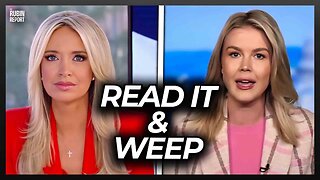 43:39
43:39
The Rubin Report
3 hours agoHost Goes Quiet as Press Sec Destroys Jimmy Kimmel Narrative w/ Facts in Under 1 Minute
41.3K18 -
 LIVE
LIVE
Side Scrollers Podcast
3 hours agoKimmel RETURNS + Twitch University + More! | Side Scrollers
393 watching -
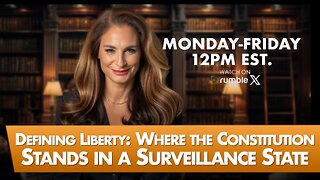
The Mel K Show
2 hours agoMORNINGS WITH MEL K Defining Liberty: Where the Constitution Stands in a Surveillance State 9-23-25
29.1K3 -
 LIVE
LIVE
The Shannon Joy Show
3 hours agoFree Speech, Free Markets & The Political Weaponization Of Charlie Kirk. Live With Matt Kibbe
242 watching -
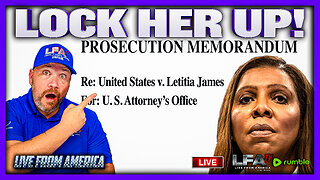 LIVE
LIVE
LFA TV
14 hours agoBREAKING NEWS ALL DAY! | TUESDAY 9/23/25
3,978 watching -
 35:28
35:28
Grant Stinchfield
2 hours agoTylenol Tied to Autism? Or is it a Convenient Scapegoat?
17.2K5 -
 1:03:18
1:03:18
VINCE
4 hours agoDIsney Caves To The Woke Mob | Episode 131 - 09/23/25
219K286 -
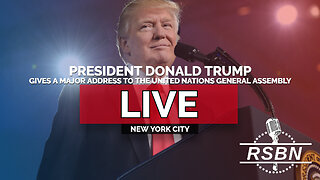 2:31:14
2:31:14
Right Side Broadcasting Network
1 day agoLIVE REPLAY: President Trump Gives a Major Address to the United Nations General Assembly in NYC - 9/23/25
113K96